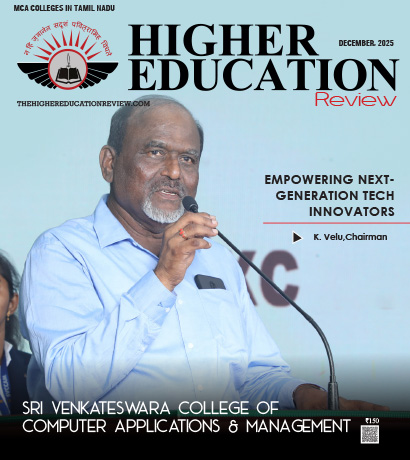Dr. Alka is the Director and Professor at Symbiosis Institute of International Business (SIIB) is a Computer Science Graduate and has done her Master’s in International Business from the Indian Institute of Foreign Trade IIFT), New Delhi, India, and her Ph.D Business from Jiwaji University, Gwalior, India. She has over 28 years of experience in teaching, research and consulting. Dr. Alka was working in the industry before joining AIBS. She worked with The Plastics Export Promotion Council (Plexconcil) as Deputy Director, NCTI (National Centre for Trade Information), a UN-designated Trade Point in India, and few Export Houses as well.
Opportunities in Higher Education in the Field of International Business
 Dr. Alka Maurya, Director, SIIB Pune in a recent interaction with Janifha Evangeline, Higher Education Review magazine shared her views on the current global trends influencing career opportunities in International Business, and how can higher education programs prepare students to leverage these trends, how graduates from International Business programs can maximize their career potential, especially in competitive global markets and more.
Dr. Alka Maurya, Director, SIIB Pune in a recent interaction with Janifha Evangeline, Higher Education Review magazine shared her views on the current global trends influencing career opportunities in International Business, and how can higher education programs prepare students to leverage these trends, how graduates from International Business programs can maximize their career potential, especially in competitive global markets and more.
What are the current global trends influencing career opportunities in International Business, and how can higher education programs prepare students to leverage these trends?
In the current international business environment, we observe a significant trend of companies actively participating in the globalization process. This is often referred to as Globalization 4.0, where globalization is integrated with advanced technologies, redefining how businesses operate on a global scale. This represents one of the most transformative trends reshaping international business today.
In addition to globalization, the integration of digital technologies is playing a pivotal role in changing the business landscape. Innovations such as artificial intelligence, cloud computing, blockchain, and others are becoming integral to business processes, enhancing efficiency, decision-making, and overall competitiveness.
Furthermore, the emphasis on sustainability and ESG (Environmental, Social, and Governance) considerations has become paramount, driven by the United Nations' Sustainable Development Goals. Organizations are increasingly required to embed these principles into their business strategies and operations, aligning with global standards and expectations.
Another critical factor influencing international business opportunities is the geopolitical landscape. For instance, with Donald Trump as the President of the United States, significant geopolitical shifts have emerged. For countries like India, an emerging economy leading global growth, these shifts are particularly impactful. Changes in bilateral relations, diplomatic ties, and the global perception of India are opening up new avenues and opportunities in the realm of international business.
In summary, the international business environment is being shaped by Globalization 4.0, digital technology integration, sustainability and ESG imperatives, and the evolving geopolitical dynamics, all of which are redefining how businesses operate and create value in a globalized world.
What emerging roles in International Business are likely to shape future career paths, and how can students prepare for these roles?
Traditionally, around a decade ago when I pursued my MBA at IIFT, the typical career paths after completing an MBA in International Business were roles such as International Marketing Manager, Marketing Manager in an international department, or Global Financial Expert, among others. However, in the current scenario, the field of international business is evolving significantly, particularly with the integration of digital technologies across various business functions.
Today, emerging roles in international business demand candidates who not only have a solid grasp of theoretical management concepts but also possess an understanding of how technology enhances efficiency and effectiveness. For instance, when hiring a marketing manager, companies now prioritize skills like digital marketing and marketing analytics in addition to traditional marketing expertise.
In parallel with these changes, businesses are increasingly emphasizing the incorporation of sustainability into their operations. This is reflected in growing opportunities in fields like global supply chain management, as logistics companies expand rapidly. Additionally, as Indian companies expand internationally and acquire foreign entities, roles such as cross-border mergers and acquisitions experts are becoming increasingly prominent.
Furthermore, organizations across industries are actively seeking candidates who have hands-on experience with the latest technologies relevant to their fields. These developments are creating a diverse array of new opportunities, complementing the traditional profiles that companies have historically offered.
How can graduates from International Business programs maximize their career potential, especially in competitive global markets? What career opportunities exist within International Business for those interested in niche areas like sustainability, ethical trade, and social responsibility?
Today’s graduates have abundant resources, but this can sometimes lead to a lack of focus. Staying aligned with core career goals is essential. Students must set clear, actionable goals and work toward them with dedication. For example, a student aiming for a career in supply chain management should identify their target sector and companies early in their MBA. This clarity allows them to strategically plan their learning journey, selecting relevant live projects, internships, and opportunities that align with their aspirations.
Practical experience is invaluable. Beyond summer internships, students should explore additional opportunities such as live or remote projects, especially in today’s hybrid work environment. These experiences offer real-world exposure and deepen their understanding of industry practices.
Building a strong professional network is another critical step. Platforms like LinkedIn provide powerful tools for connecting with industry professionals and peers. Starting early in their MBA, students can build a robust network to enhance their chances of securing internships and placements, positioning them for long-term success.
Staying informed about business trends and global developments is equally important. Regular reading of newspapers, industry journals, and online sources gives students a competitive edge in interviews and helps them make informed career decisions.
Lastly, soft skills are vital differentiators in the global job market. Companies value interpersonal and communication skills alongside technical expertise. Students should actively develop teamwork, adaptability, and emotional intelligence to excel in professional environments.
In summary, students can maximize their career potential by focusing on clear goals, gaining practical experience, leveraging networking platforms, staying informed, and honing soft skills. Mastering these areas will prepare them for success in today’s competitive global landscape.
What advice would you give to students considering a career in International Business on building a successful career in this dynamic and globalized field?
With a plethora of career options now available, students must remain focused to navigate their paths effectively. Establishing a clear, actionable plan early considering family background, interests, and goals is essential. For example, a student whose father owned a jewelry business aligned his MBA journey with internships and projects in the gems sector, ultimately becoming a successful entrepreneur. Such focus and direction highlight the power of clarity.
Continuous learning is another critical factor. Students should regularly update themselves on global events and industry trends, connecting theoretical knowledge to real-world applications. For instance, concepts like brand management or currency fluctuations become more relevant when linked to market strategies or economic events.
Effective communication is equally important. Success in professional environments demands proficiency in both oral and written communication. Moreover, as businesses increasingly operate across cultural boundaries, adaptability, inclusion, and resilience are invaluable traits for thriving in diverse workplaces. Companies reward such global readiness with better roles and compensation.
Building a professional network is also vital. Platforms like LinkedIn allow students to connect with industry leaders and peers, creating opportunities for internships, placements, and career growth. Finally, managing stress is crucial. Emotional intelligence helps maintain productivity and balance in today’s high-pressure environments.
In summary, clear goals, constant learning, strong communication, adaptability, professional networking, and emotional intelligence are key to thriving in a competitive global landscape. By focusing on these areas, students can unlock their full potential and achieve success.

